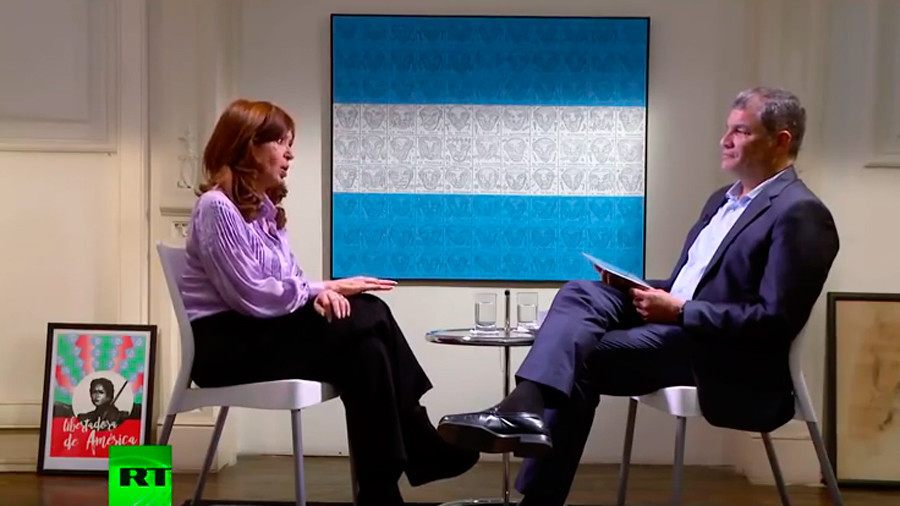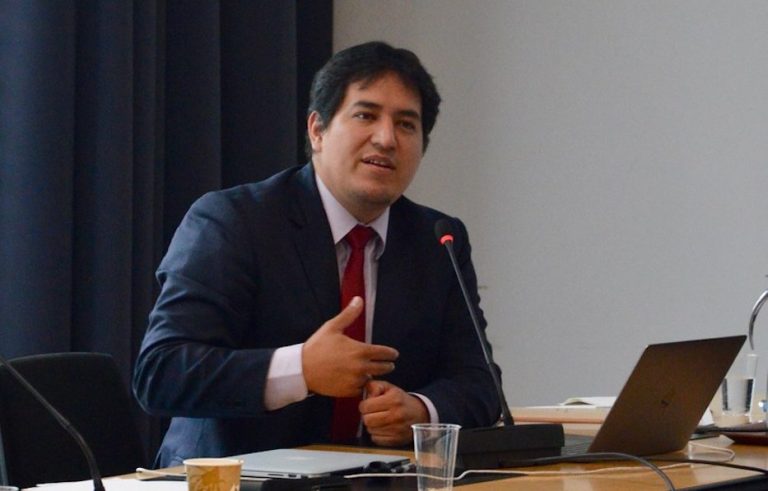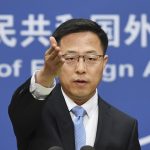Pandemic and sizeable external debt of Ecuador has made socialists more popular thereby strengthening positions of leftist candidate Andrés Arauz. 36-year-old economist, former head of the central bank, Arauz is the protégé of socialist ex-president Rafael Correa’s whose political influence remains strong in Ecuador despite a corruption conviction that disqualified him from running as Arauz’s deputy.
Arauz has vowed to pave the way for the political comeback of Correa who claims his graft conviction is evidence of political persecution under Moreno. Correa is in Belgium, avoiding an eight-year jail term. Arauz could pardon Correa or seek a judicial review of the case against him.
Like Correa, Arauz is supported by the Kremlin. He speaks Russian; since March 1, 2018, his patron has been hosting a Spanish political talk show ‘Conversation with Correa’ broadcast in Russian TV channel Russia Today. Thus, the Kremlin supports Arauz hoping to form a pro-Russian belt in Latin America: Cuba, Nicaragua, Venezuela, Ecuador, Bolivia, Argentina.

On April 11, Andrés Arauz of the National Union for Hope (UNES) will face off against Guillermo Lasso of the right-wing coalition of Creating Opportunities party (CREO) and Social Christian Party (PSC), in the run-off elections to determine who will be the next president of Ecuador. The first round was held on February 7 where Arauz won over his opponents with 32.72%. Runner up Guillermo Lasso clinched the second place with 19.74% of the votes, a mere 32,000 votes went to candidate Yaku Pérez. It will be the most critical presidential election the country has faced since the return to democracy.
Whoever wins the upcoming elections he will have to solve the country’s key problems. According to public opinion polls, the main problems Ecuadorians perceive are an economic crisis, poverty, and debt; unemployment and underemployment; corruption and justice; the Covid-19 pandemic; insecurity and violence; and education.
Since the first round of elections, Ecuadorians have witnessed corruption scandals involving current government officials trading vaccines for favors and suspicious activity from third-place leftist candidate Yaku Pérez and even his military coup d’etat calls. The country has also experienced a deep polarization and a significant increase in COVID-19 cases and deaths.
Another major event in the country is the April,1 declaration of a state of emergency in eight provinces in order to slow the COVID-19 spread. The state of emergency implemented on April 2 was decreed by president Lenín Moreno following a recommendation from the Committee of Emergency Operations (COE).
In October 2019, hundreds of thousands of Ecuadorians from Indigenous, peasant, student, youth organizations, trade unions, and other social sectors took part in 10-day mass protests against Decree 883 which sought to introduce a set of unpopular neoliberal reforms. The people’s uprising achieved the withdrawal of Decree 883 which sought to remove fuel subsidies which would have led to massive price rises across the board, and anti-labor measures. These were part of a $4.2 billion agreement with the International Monetary Fund.
Even as the level of mobilization by the Ecuadorian people was historic, the repression unleashed against the protests by the Government of Lenín Moreno was also unprecedented. The violence carried out by National Police and the Army against protesters caused the death of at least 7 (there is discrepancy as to the official number of deaths). More than 2,000 were injured and over a thousand detained.
Arauz’s supporters try to show the project of Guillermo Lasso, as a continuation of Lenín Moreno’s repressive neoliberal rule and undermine his positions.
On Friday April 2, Lasso’s campaign caravan attempted to enter the town of Guamote to hold a campaign event but were stopped at the entrance of the town by a blockade organized by the community. Members of the community led by Mayor Delfín Quishpe, declared that Lasso is not welcome in their community because he might supported the repression during the October uprising.
Arauz has pledged to pay $1 billion in direct cash to families and withdraw the $6.5 billion IMF financing package.
His main contender, Guillermo Lasso, has suffered from his image as a conservative banker; moreover, as opinion polls show the predicted low voter turnout because of the pandemic could turn his back on.
Arauz’s victory will speed up Latin America’s return to left-wing politics, as it can be already seen in Argentina and Bolivia. It is a challenge for Washington and an opportunity for China and Russia to strengthen their positions in the Western Hemisphere.
However, Arauz insisted that his government would keep the US dollar as the national currency and strengthen it.
It is widely believed that if Arauz wins, Correa would actually be the one governing, albeit by proxy. Arauz is certainly widely recognized as Correa’s protégé, and many in Ecuador question whether Arauz – if victorious – will resemble the demagogue Correa of 2007 or the pragmatic Correa of 2013.
The world’s epidemiological situation has reduced fuel demand and declined oil prices, Ecuador’s main export product thereby hurting its economy greatly. As a result, public expenses have also decreased.
President Lenin Moreno, Correa’s former ally, lobbied a pro-market course hoping to revive a sluggish and heavily indebted economy. His efforts sparked an outcry: in 2019 10-day severe street protests were organized against plans to increase fuel price.
Arauz’s victory will worsen economic situation because of a possible termination of the IMF cooperation and social expenditures increase having an imbalanced budget and corrupt investments from China and Russia.Arauz said he would continue pay the country’s debts, but prioritize social investments. In addition, he called for an investigation into the restructuring of last year’s bond to the amount of $17.4 billion. This prospect has already triggered bond sell-off. In January 2021, Ecuadorian bonds showed the worst JPMorgan EMBI Global Diversified Index results (total bond yield -15%).




